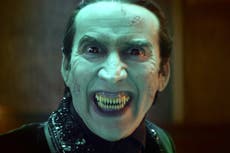Eddie Marsan says he was ‘afraid of white working-class men’ growing up
‘My experience of growing up within the white working class, [there] was always an element of fear,’ actor said
Eddie Marsan admitted to being fearful of “white working-class men” while growing up in east London.
The Ray Donovan actor was born into a working-class family in Bethnal Green; his father was a lorry driver and his mother was a school dinner lady.
On the Channel 4 News podcast Ways To Change The World With Krishnan Guru-Murthy, Marsan said there was “a lot of violence” when he was growing up, “a lot of criminality”.
“The estate where I was raised, most of the fathers had court orders not to come near the house.”
Guru-Murthy asked the actor if he remembered being “afraid of men” as a young boy.
“I remember being afraid of white working-class men,” the actor responded.
“It’s very interesting... there are other actors from the same background like Danny Dyer or Ray Winstone who are much more successful and much more charismatic in portraying those men,” he continued.
“I mean, when you see Danny Dyer and Ray Winstone, they have a kind of appeal to me and I’ve never been able to do that, and it’s because my experience of growing up within the white working class, [there] was always an element of fear. I always felt very vulnerable.”
Marsan was born a year before the Divorce Reform Act (1969) – which allowed couples to divorce without proving fault – was passed.
He added: “It was the beginning of women’s liberation, women were beginning to divorce [their] husbands, who were treating them bad, and 20, 30 years earlier, they didn’t divorce them, they just stuck it out.
“So men began to feel like their power was being taken away and that’s why they then turned to violence.”
Earlier this week, Marsan won plaudits on Twitter for having the perfect response to the friend of a college “bully” who tried to mock him on social media.
Join our commenting forum
Join thought-provoking conversations, follow other Independent readers and see their replies
Comments


Bookmark popover
Removed from bookmarks